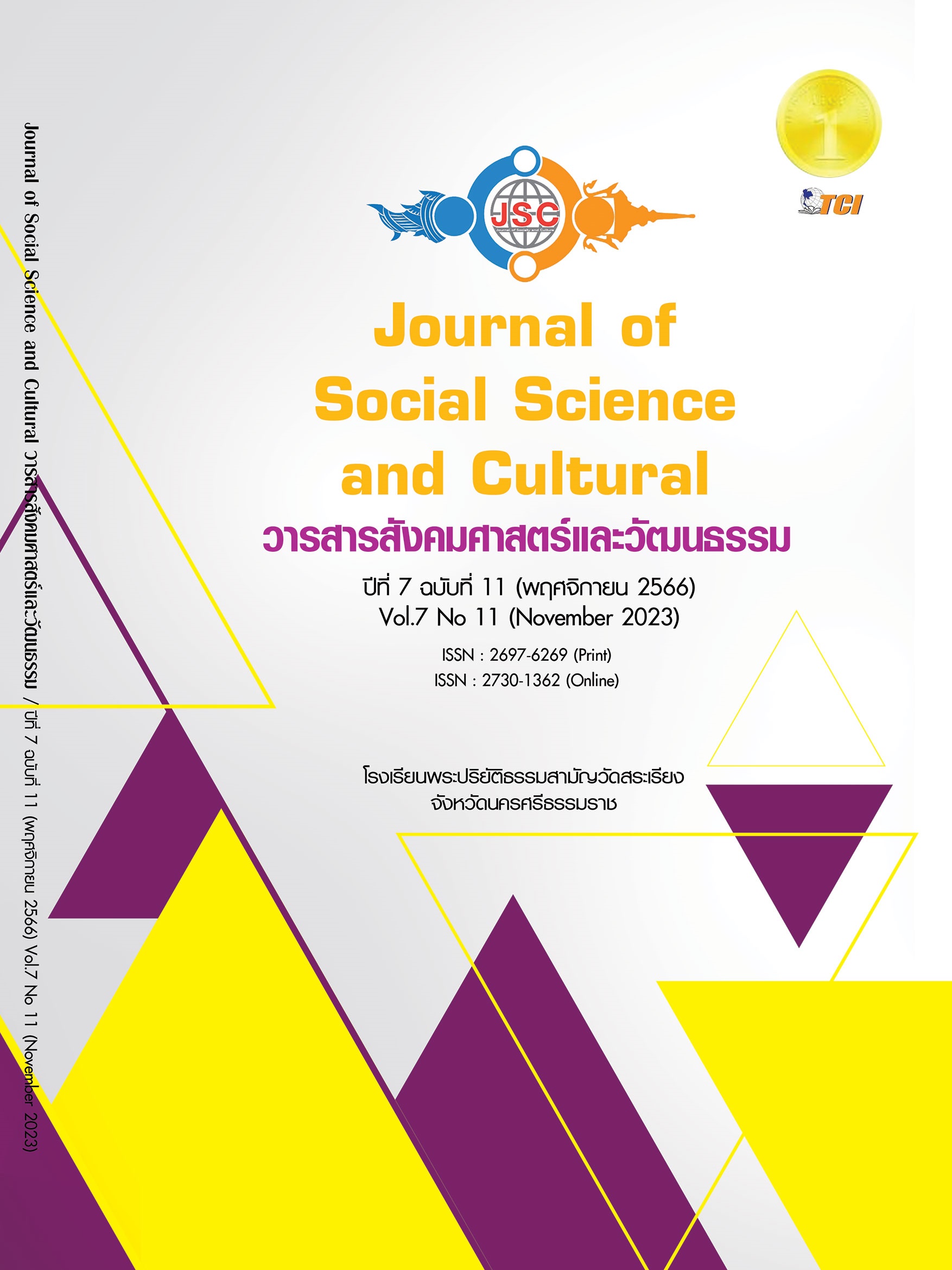META-ANALYSIS OF FACTORS RELATED TO ENTREPRENEURSHIP
Main Article Content
Abstract
This research study is a meta-analysis on entrepreneurship. The objectives are: 1) To study the characteristics of research that studies entrepreneurship. 2) To find factors that are related to entrepreneurship. 3) To study the relationship structure model of factors related to entrepreneurship. 4) To summarize knowledge from the findings and present guidelines for promoting entrepreneurship. It is a meta-analysis on entrepreneurship. The population used for the study is Research that studies entrepreneurship. They are research articles, research reports, theses, and dissertations. Published in academic journals, both Thai and foreign, in the period 2018 - 2022. Searched from Web of Science (WoS), Google Scholar, ResearchGate, Academia, Science Direct, a total of 548 studies were selected. Remaining 173 studies. The results of the research yielded 764 correlation values in the form of correlation coefficients. The combined effect size before and after transforming Z - Fisher value is equal to 0.472 and 0.563, divided into 95 results correlation values of intention factors, there is a combined effect size equal to 0.760 and it is a partial correlation value of 669 bivariable. The combined effect sizes are divided into subgroups classified according to the factor structure that is related to entrepreneurship. It can be concluded that the entrepreneurial support factor group affects the entrepreneurial characteristics factor group and the planned behavior theory factor group, which has 3 main components: attitude, personal norm, and perceived behavioral control. Affects the intention to become an entrepreneur. and received guidelines for supporting entrepreneurship from supporting factors in 4 areas, namely entrepreneurship education Perception of support Inspiration from role models and network of relationships in creating motivation.
Article Details
References
คมกริช นันทะโรจพงศ์ และคณะ. (2561). พฤติกรรมการเป็นผู้ประกอบการของวัยรุ่นไทย: อิทธิพลของการรับรู้ ความสามารถตนเองและการรับรู้การสนับสนุนทางสังคมต่อความตั้งใจในการเป็นผู้ประกอบการในบริบทวัฒนธรรมแบบรวมกลุ่ม. วารสารบริหารธุรกิจศรีนครินทรวิโรฒ, 9(2), 44-59.
ชาญชัย พรมมิ และ สิริมา นาคสาย. (2563). ปัจจัยที่มีอิทธิพลต่อความตั้งใจเป็นผู้ประกอบการของนิสิต หลักสูตรที่มุ่งเน้นการเป็นผู้ประกอบการมหาวิทยาลัยพะเยา. วารสารบริหารธุรกิจและสังคมศาสตร์ มหาวิทยาลัยรามคำแหง, 3(3), 68-80.
พิมพิกา พูลสวัสด์ และ วิษณุพงษ์ โพธิพิรุฬห์. (2562). อิทธิพลของปัจจัยตามทฤษฎีพฤติกรรรมแผนที่มีต่อความตั้งใจที่จะเป็นผู้ประกอบการของนักศึกษาปริญญาตรี มหาวิทยาลัยราชภัฏภูเก็ต. วารสารบริหารธุรกิจ ศรีนครินทรวิโรฒ, 10(2), 50-61.
มานิตย์ มัลลวงค์ และ วิวัฒน์โชติกร เรืองจันทร์. (2563). ปัจจัยที่มีความสัมพันธ์กับความตั้งใจที่จะเป็นผู้ประกอบการของนักศึกษาคณะบริหารธุรกิจและศิลปศาสตร์ มหาวิทยาลัยเทคโนโลยีราชมงคลล้านนา เชียงใหม่. วารสารบริหารธุรกิจและศิลปศาสตร์ ราชมงคลล้านนา, 8(1), 53-67.
สรสินธุ์ ฉายสินสอน. (2564). ปัจจัยเชิงสาเหตุด้านคุณลักษณะผู้ประกอบการ และการรับรู้เทคโนโลยีที่ส่งผลต่อพฤติกรรมการยอมรับเทคโนโลยีคลังสินค้าอัจฉริยะเชิงพาณิชย์ ของผู้ประกอบการวิสาหกิจขนาดกลางและขนาดย่อมในประเทศไทย. วารสารสถิติประยุกต์และเทคโนโลยีสารสนเทศ, 6(1), 21-36.
สำนักส่งเสริมวิสาหกิจสำนักงานส่งเสริมวิสาหกิจขนาดกลางและขนาดย่อม (สสว.). (2566). แดชบอร์ดเว็บไซต์. เรียกใช้เมื่อ 20 ตุลาคม 2566 จาก https://www.sme.go.th/th/page.php?modulekey=469
สุกฤตา สุวรรณกฤต. (2564). ปัจจัยกำหนดความสำเร็จในการประกอบการของผู้ประกอบการวิสาหกิจเริ่มต้น. วารสารบริหารธุรกิจและสังคมศาสตร์ มหาวิทยาลัยรามคำแหง, 4(1), 126-144.
Harris, C. et al. (2019). The Handbook of Research Synthesis and Meta-Analysis. 3rd Edition. New York: Russell Sage Foundation.
Henk, V. R. et al. (2018). User manual for Meta-Essentials: Workbooks for meta-analysis, Version 1.4, updated July 2018, The Meta-Essentials workbooks are licensed under the Creative Commons Attribution-NonCommercial-ShareAlike 4.0 International License. Retrieved July 26 , 2022, from http://creativecommons.org/licenses/by-nc-sa/4.0/. Access date.
Icek, A. (1991). The Theory of Planned Behavior. Organizational Behavior and Human Decision Processes, 50(2), 179-211.
Tony, H. et al. (2018). How to interpret results of meta-analysis. (Version 1.4) Rotterdam, The Netherlands: Erasmus Rotterdam Institute of Management. Retrieved July 26 , 2022, from www.erim.eur.nl/research- support/meta-essentials/downloads.


